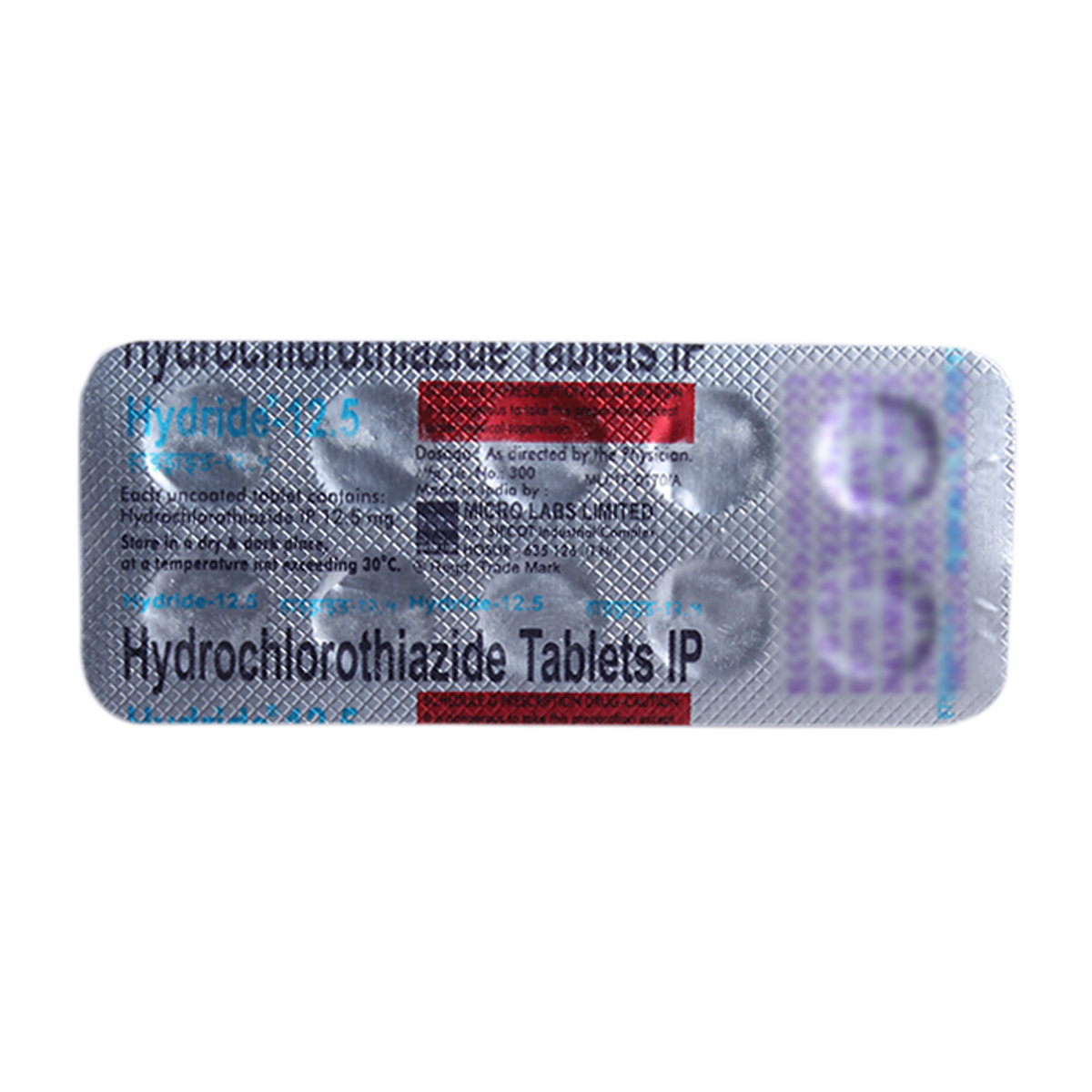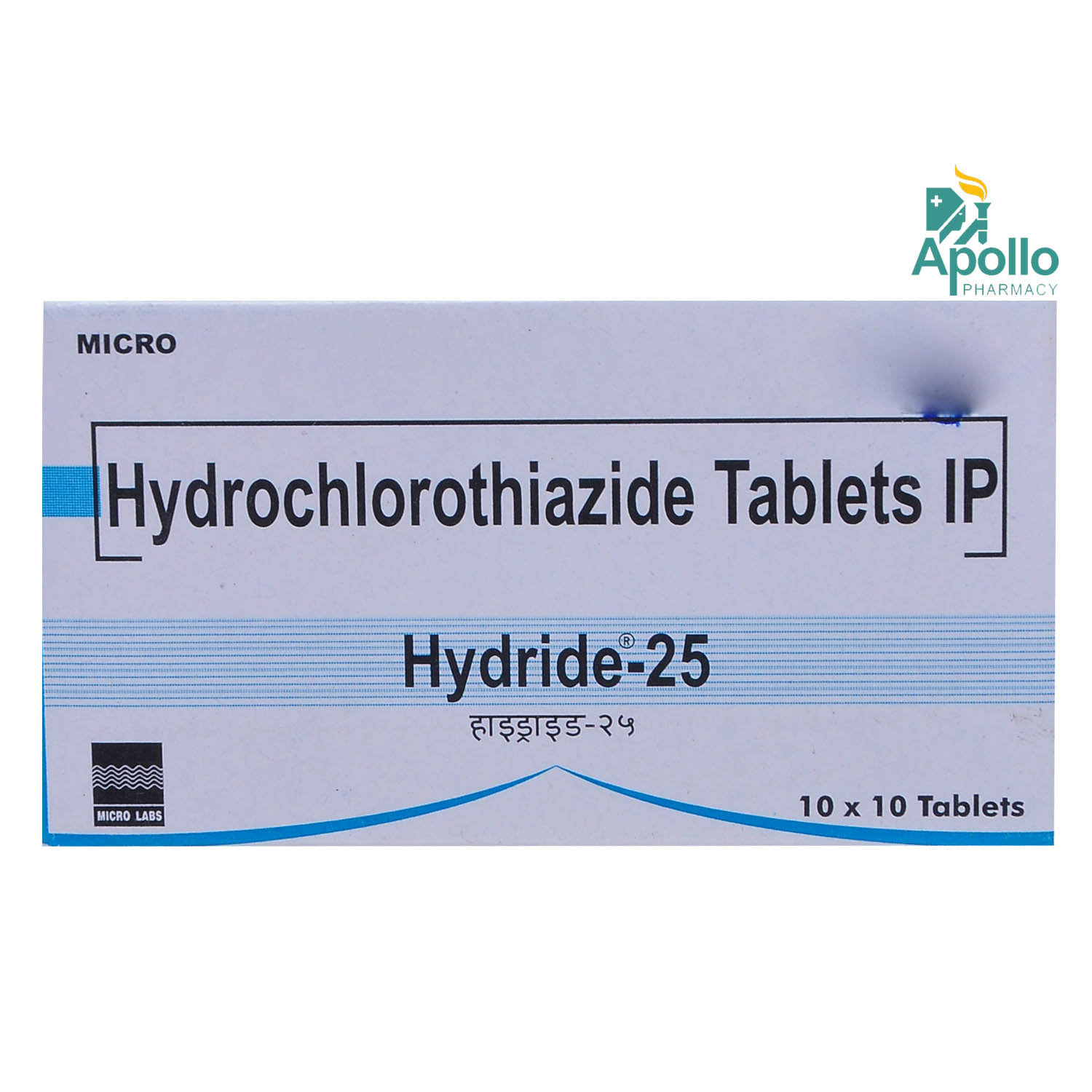Hydrochlorothiazide
About Hydrochlorothiazide
Hydrochlorothiazide is used to treat high blood pressure and oedema (a build-up of fluid in the body). Diuretics are sometimes called 'water pills' because they make you urinate more. Besides this Hydrochlorothiazide is also sometimes used to help you urinate when your kidneys aren't working properly. High blood pressure or hypertension is a chronic condition in which the force exerted by the blood against the artery wall is high. The higher this blood pressure, the harder the heart has to pump. As a result, it leads to heart disease, irregular heartbeat, and other complications. Oedema (swelling) may occur in case of high blood pressure, where fluids of the body get trapped in the tissues of the hands, arms, feet, ankles, and legs.
Hydrochlorothiazide works by increasing the amount of urine that is passed out from the kidneys. It effectively reduces excess fluid levels in the body and treats oedema (swelling) associated with heart, liver, kidney, or lung disease. This reduces the workload on the heart and makes the heart more efficient at pumping blood throughout the body. Thus, it helps to lower high blood pressure, reducing the chances of heart attack or stroke.
You can take Hydrochlorothiazide with food or without food. It should be swallowed whole with a glass of water. Do not chew, bite, or break it. Your doctor will advise you on how often you take your tablets based on your medical condition. Sometimes, you may experience dehydration, headache, nausea, or dizziness. Most of these side effects of Hydrochlorothiazide do not require medical attention and gradually resolve over time. However, if the side effects are persistent, reach out to your doctor.
Try not to stop taking the Hydrochlorothiazide of your own. Let your doctor know about this, as it may cause a rise in blood pressure and can increase the risk of heart disease and stroke. Inform your doctor if you are suffering from kidney, liver, or heart disease. If you are pregnant or breastfeeding, please tell your doctor so that the dosage of Hydrochlorothiazide can be prescribed accordingly. Please tell your doctor if you are taking any other medicines or are allergic to Hydrochlorothiazide. Reducing the amount of table salt (sodium chloride) in your food often relieves the swelling of the body.
Uses of Hydrochlorothiazide
Medicinal Benefits
When you take Hydrochlorothiazide, the blood vessels in your body will be relaxed, which will help lower the blood pressure. Also, it relaxes the blood vessels and helps to improve the blood flow. It helps in losing excess fluids from the body by increasing the production of urine. This reduces the workload on the heart and makes the heart more efficient at pumping blood throughout the body. Thus, it helps to lower high blood pressure, reducing the chances of heart attack or stroke. Besides, this relieves oedema and helps you carry out your daily activities more efficiently.
Directions for Use
- Take Hydrochlorothiazide with or without food as advised by your doctor.
- It is advised to take Hydrochlorothiazide once daily; however, follow your doctor’s recommendation regarding the dosage and duration.
- Swallow Hydrochlorothiazide as a whole with a glass of water.
- Do not crush, chew, or break it.
Storage
Side Effects of Hydrochlorothiazide
- Hypotension (low blood pressure)
- Dehydration
- Headache
- Somnolence (excessive sleepiness)
- Fatigue
- Reduced levels of potassium and magnesium in your blood
Drug Warnings
Before using Hydrochlorothiazide, tell your doctor if you have liver disease, kidney disease, eye problem (glaucoma), asthma, increased uric acid level (gout), diabetes, or allergic to antibiotics (like sulpha drugs or penicillin). Hydrochlorothiazide should not be given to the people allergic to Hydrochlorothiazide, have low blood pressure (less than 90 mm of Hg), or have had a heart attack, kidney disease, or liver disease. Besides this, it is contraindicated in low blood pressure (hypotension), cardiogenic shock (sudden stopping of blood flow to the heart), and aortic stenosis (heart valve problem). Inform your doctor if you are pregnant, suspect you are pregnant, plan to have a baby or if you are breastfeeding; your doctor will prescribe Hydrochlorothiazide only if the benefits outweigh the risk. Before taking the Hydrochlorothiazide, inform your doctor about your medical history and ongoing therapies to rule out any potential adverse effects or interactions.
Drug Interactions
Drug-Drug Interactions: Hydrochlorothiazide may interact with other Other diuretics, blood pressure-lowering drugs (metoprolol, ramipril, atorvastatin), and can lower your blood pressure leading to severe condition. Besides this, it also interacts with anti-epilepsy medicines (carbamazepine, phenobarbital), anti-depression medicines (lithium), immune-suppressing drugs (cyclosporine), anti-diabetic drugs (metformin), and painkillers (ibuprofen, aspirin) etc. If you are taking any of the above, speak with your doctor.
Drug-Food Interactions: You are recommended not to consume alcohol along with Hydrochlorothiazide to avoid unpleasant side effects.
Drug-Disease Interactions: Hydrochlorothiazide should not be given to people with cardiogenic shock (when the heart fails to pump required blood to the body), heart valve problem (stenosis), low blood pressure (hypotension), coronary heart disease, liver disease, or heart failure, gout, low serum potassium (hypokalemia), patients with nil urine output (anuria) etc.
Drug-Drug Interactions Checker List:
Safety Advice

Alcohol
unsafeYou are recommended not to consume alcohol along with Hydrochlorothiazide to avoid unpleasant side-effects.

Pregnancy
cautionHydrochlorothiazide should not be used during pregnancy unless clearly necessary. Your doctor will weigh the benefits and any potential risks before prescribing it to you. Please consult your doctor.

Breast Feeding
cautionHydrochlorothiazide should not be used when breastfeeding unless clearly necessary. Your doctor will weigh the benefits and any potential risks before prescribing it to you. Please consult your doctor.

Driving
unsafeIt is not recommended to drive after taking Hydrochlorothiazide as it may occasionally cause drowsiness.

Liver
cautionHydrochlorothiazide to be taken with caution, especially if you have a history of liver diseases/conditions. Your doctor may adjust your dose depending upon your current liver conditions.

Kidney
cautionHydrochlorothiazide to be taken with caution, especially if you have a history of Kidney diseases/conditions. Your doctor may adjust your dose depending upon your current kidney conditions.

Children
cautionHydrochlorothiazide to be taken with caution, especially if you are children below the age of 12. Your doctor may adjust your dose depending upon your age.
Habit Forming
Diet & Lifestyle Advise
- Consume antioxidant-rich food. Blueberries, cherries, tomatoes, squash, and bell peppers are high in antioxidants.
- Eat natural diuretic foods. Asparagus, beets, green beans, grapes, onion, leafy greens, pineapple, leeks, pumpkin, and garlic are all-natural diuretic foods.
- Use healthy cooking oils like soybean, olive, canola, and coconut oil.
- You should avoid refined foods such as white bread, spaghetti, sugar, and red meat.
- Reduce or eliminate Trans fatty acids, which are found in commercially baked items such as cookies, cakes, crackers, French fries, onion rings, doughnuts, and processed foods.
- Avoid consumption of too much salt or salty food.
- Keep your weight under control with a BMI of 19.5-24.9.
- Regular physical activity or exercise like walking improves your blood flow.
- When possible, elevate your legs or the swollen area on a chair or pillows.
- Avoid standing or sitting for extended periods of time.
- Avoid chronic stress as it can raise your blood pressure.
- Spend time with your loved ones to cope with stress and practice mindfulness techniques.
- Quitting smoking and alcohol consumption is the best strategy to lower the risk of many health complications.
Special Advise
- The monitoring of serum electrolytes is particularly important while taking hydrochlorothiazide.
Patients Concern
Disease/Condition Glossary
Hypertension: The blood exerts increased pressure on the walls of blood vessels, leading to hypertension. High blood pressure is expressed as systolic/diastolic pressure. Systolic pressure is the pressure in the arteries when the heart beats or pumps out blood. Diastolic pressure is the pressure in the arteries between the heartbeats. Blood pressure is measured in millimetres of mercury (mmHg) by a blood pressure monitor called a sphygmomanometer. Some of the symptoms are headache, dizziness, nosebleeds, altered vision, chest pain, weakness, and shortness of breath. However, most of the time, there are no signs or symptoms of hypertension.
Oedema: Oedema, also known as fluid overload, occurs due to fluid build-up in spaces between the cells. Oedema can result from a variety of factors. Some oedema reasons are caused by your lifestyle, while an underlying medical problem causes others. Shortness of breath, chest pain (angina), abnormal heart rhythms (arrhythmia), and swelling in hands or abdominal areas are the symptoms of oedema.
FAQs
Hydrochlorothiazide treats high blood pressure and oedema (a fluid build-up in the body).
It is a medical term for fluid retention. Due to oedema, the affected area starts swelling up. If it does not subside, please consult your doctor immediately.
No, you are advised to inform your doctor and monitor your blood pressure for at least two weeks before stopping the medicine. Depending upon your current blood pressure readings, there is a possibility your doctor may lower your medicine dosage and not recommend to discontinue it.
Hydrochlorothiazide can be safely taken as long as your doctor has prescribed it to you. Conditions such as high blood pressure are life-long conditions and one should not abruptly discontinue it without discussing it with a doctor.
Yes, prolonged intake of Hydrochlorothiazide may decrease your potassium levels in the bloodstream. So, it is better to ask your doctor about foods high in potassium like bananas or orange juice. Besides this, consult a doctor regarding the use of table salt or sodium chloride or salt substitute containing potassium.
Hydrochlorothiazide may make you more skin more sensitive to the sun and may also increase your risk for skin cancer if used for a long time. Try to limit your time in the sun and avoid tanning booths and sunlamps. You can also use sunscreen and wear protective clothing when outdoors.
If you miss a dose of Hydrochlorothiazide, then take the missed dose as soon as you remember and if it is the time for the next dose, skip the missed dose and continue taking a regular dose. Avoid taking the double dose to make up for the missed one.
No, Hydrochlorothiazide is not a blood thinner. It is a diuretic that works on the kidneys to remove excess water and salt from the body.
Take Hydrochlorothiazide daily only if it is prescribed by your doctor. Follow your doctor’s instructions carefully.
Hydrochlorothiazide contains hydrochlorothiazide as its active substance.
You are recommended to take your doctor’s advice before taking Hydrochlorothiazide for kidney stones. Do not self-medicate.
Hydrochlorothiazide causes side effects such as hypotension(low blood pressure), dehydration, headache, fatigue, reduced levels of potassium and magnesium in your body. Please, consult the doctor if these persist longer.






